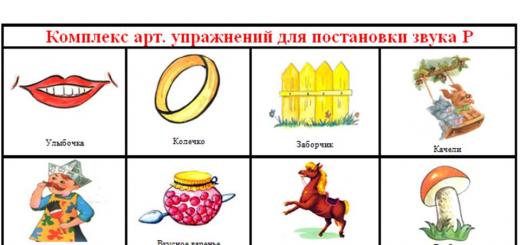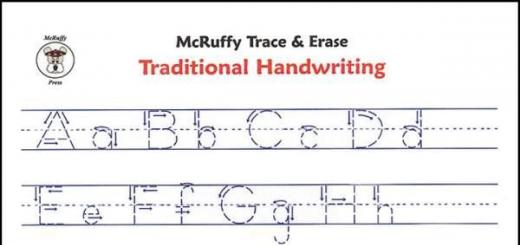I think you will agree that the greatest annoyance in learning a language for us is the need to memorize a large amount of information when it is not covered by some simple rule. And if, for example, the quantity irregular verbs relatively small (at least in English language), then the choice correct stress covers most of the vocabulary.
Students can be envied French, - it is very difficult to make a mistake with the stress when it is guaranteed to fall on the last syllable. In Russian, we do not rely on any rules when choosing stress, with the exception of always stressed yo. The situation is aggravated by the fact that the stress is often meaningful. W but mok - deputy about k, p but rit - steam And t, etc.
How are things in English? English lexicon most of us expand through textbooks and the Internet, and not in the process of live communication, as happened with the Russian language. A simple example: you meet a new word in the text compliment. The context tells you that its meaning is the same as the Russian word “compliment”, reading it is also not a problem, you don’t even need to look into the dictionary. But with stress, confusion can arise due to the fact that we know very well which syllable the stress falls on in the Russian word.
IN school curriculum I don’t remember any special rules or recommendations regarding stresses, and for the time being I was convinced that in English with stresses the same confusion as in Russian. However, if you ask an Englishman which syllable is usually stressed in English, the answer is almost certainly the first syllable. "What nonsense!" you might say, “what about about, eleven, and before?” Let's not rush and try to figure out what the British mean. The correctness of stress is best checked orally with a person who speaks the language. That's how it's best remembered. Dictionary, in extreme cases, is also suitable. And the considerations below will help make life much easier.
Fortunately, stress in English is far from random. The most general trend traced here is the very stress on the first syllable. From a practical point of view, this means that if you are not sure which syllable to stress, no one to ask :) put the stress on the first syllable.
C o mpliment [ˈkɒmplɪmənt] - compliment e nt
St a ndard [ˈstændəd] - standard but rt
R u ssia [ˈrʌʃə] - Ross And I
M o scow [ˈmɒskəʊ] - Moscow but
For the rest, watch the words and track the patterns, which, by the way, may concern not only the placement of stresses. Most of these patterns are associated with prefixes and suffixes. Some suffixes, which came from Latin or Greek, fix the stress quite clearly. Moreover, in a word without this suffix, the stress may fall on another syllable.
Let's say suffixes -tion, -cian And -cial shift the stress to the syllable that precedes them:
inf o rm [ɪnˈfɔːm] — inform a tion [ˌɪnfəˈmeɪʃən]
C o nstitute [ˈkɒnstɪtjuːt] - constit u tion [ˌkɒnstɪˈtjuːʃən]
O ptic [ˈɒptɪk] - opt i cian [ɒpˈtɪʃən]
B e nefit [ˈbɛnɪfɪt] - benef i cial [ˌbɛnɪˈfɪʃəl]
A similar situation with the Greek word “logos” in the suffix position and words ending in -(g)nomy:
Ge o logy [ʤɪˈɒləʤi]
Ec o nomy [i(ː)ˈkɒnəmi]
Note that adding new suffixes can shift the stress:
Geol o gical [ʤɪəˈlɒʤɪkəl]
Econ o mic [ˌiːkəˈnɒmɪk]
or maybe not shift:
Revol u tionary [ˌrɛvəˈluːʃnəri]
Physi o gnomist [ˌfɪzɪˈɒnəmɪst]
But again, a certain pattern is repeated depending on a particular suffix or combination of them.
The general rule for prefixes is that when placing an accent, they are skipped. In words that came into English from Latin, a person who speaks Russian, as a rule, can easily distinguish Latin prefixes in-, en-, con-, com-, re-, de-, dis-, pre-, pro-, ex-, and others. The stress in such cases will almost certainly fall on one of the following syllables, as if there were no prefix. Again, most often this is the first syllable of the word root.
Conv e rge [kənˈvɜːʤ]
deconstr u ct [ˌdiːkənˈstrʌkt] (2 prefixes)
Enc o mpass [ɪnˈkʌmpəs]
Exch a nge [ɪksˈʧeɪnʤ]
The same is true for all possible negative prefixes. non-, un-, in-, ir-, not-.
Irr e levant [ɪˈrɛlɪvənt]
Un u sual [ʌnˈjuːʒʊəl]
But with native English prepositions, not everything is so simple:
Withdr a w [wɪðˈdrɔː]
O utcast [ˈaʊtkaːst]
O verground [ˈəʊvəgraʊnd]
IN underground stress changes depending on the part of speech: for a noun or adjective - [ ˈʌndəgraʊnd ], for an adverb - [ ˌʌndəˈgraʊnd ]
In words made up of be- plus independent word, which mostly come from Old English, skip this first syllable as well.
besp o ke [bɪˈspəʊk]
Beh o ld [bɪˈhəʊld]
Beg e t [bɪˈgɛt]
Bel o ved [bɪˈlʌvɪd]
Often a letter a- at the very beginning of the word it turns out to be a neutral unstressed vowel.
Ass e rt [əˈsɜːt]
Arr a nge [əˈreɪnʤ]
The invariable stem of the word can also be a hint:
Asc e nd [əˈsɛnd] - to rise
Desc e nd [dɪˈsɛnd] - to go down
The examples given are not exhaustive. Once you understand the principle, you will probably be able to track and adopt other similar patterns.
However, be vigilant! Of particular note is the following focus. There are a number of words that, following the pattern described, act as a verb, but if the stress is shifted to the first syllable (which is often an easily recognizable prefix), they turn into nouns:
Press e nt [ prɪˈzɛnt ] – verb “to give, present”
Pr e sent [ ˈprɛznt ] – noun “gift, present moment”
Contr a ct [kənˈtrækt] – contract, decrease
C o ntract [ˈkɒntrækt] – contract
obj e ct [əbˈʤɛkt] – to object
O bject [ˈɒbʤɪkt] - object
You have probably already noticed that the stress in English words (as well as reading, by the way) is largely determined by their etymology. Learning to distinguish from which language a word came into English is not so difficult, given that in the Russian language there are also enough borrowings from Latin, Greek, French and Germanic languages (the main donors of English vocabulary).
As an additional example, in some words that came into English from French, the stress falls, not hard to guess, on the last syllable.
bouqu e t [bʊ(ː)ˈkeɪ] — bouquet
pantal oo n [ˌpæntəˈluːn] - trousers (in American English)
Here, it’s really better to do without fanaticism, since part of the borrowings from French either happened so long ago that the language lost its memory of it, or for some other reason the original stress was not preserved. Words nuance or massage([ njʊ(ː)ˈaːns ], [ ˈmæsaːʒ ]) allow stress on any of the syllables (curiously, the original French stress in such words is more often preserved in American English), but, say, in the words p a rachute And p i geon([ ˈpærəʃuːt], [ ˈpɪʤɪn]) the stress, following the general trend, has shifted to the first syllable, and not even every dictionary admits to you that these words are borrowed from the French.
Equal to a word or part of it.
I , ten , sofa [‘sәu-fә]
English syllables are formed by vowels and sonants. From sonants, [l], [n], sometimes [m] are almost always syllabic. They form syllables when separated from a syllable-forming vowel by a consonant, i.e. when they do not border on vowels.
[‘li-tl], [‘se:-tn], [‘ri-ðm]
Stress in English words
Word stress is the emphasis on one or two syllables in a word. Such syllables are perceived as louder and stronger than others. In English, stressed syllables stand out more strongly than in Russian, being pronounced more energetically and faster.
An English stressed syllable is usually indicated by a ‘ before the beginning of the stressed syllable to be transcribed. Some obsolete dictionaries indicate stress by underlining the syllable. (Transcription of English sounds)
‘ minutes[‘minit]
below
Like Russian, English stress can fall on different syllables: ‘ lazy, dic'station. But most often it falls on the penultimate syllable or tends to the beginning of the word. In polysyllabic (from 4 syllables) words for the purposes of rhythm (usually through one syllable) there is a balancing secondary stress pronounced at half strength.
| under'standing[ | andә'stændiŋ]
i |magi'nation
stress in a sentence
Prepositional or phrasal stress is the selection of some words in a syntagma from others. In English, semantic or significant words are usually stressed in a sentence: nouns, adjectives, semantic verbs, numerals, adverbs, pronouns (interrogative, demonstrative, reciprocating, absolute possessive), interjections. Functional words are usually unstressed: articles, prepositions, conjunctions, auxiliary and modal verbs, linking verbs, personal and possessive pronouns, particles. In Russian, official words like personal and possessive pronouns usually percussion.
'Yesterday I 'lost my 'keys - YesterdayIlostkeys
Saying center
The communicative center of the utterance usually coincides with the word(s) pronounced with the final tone. Often this is the last stressed word in the syntagma. The word or words as a communicative center express the most important information of the sentence, report something new.
Mr'Smith'walkstothe'officeevery \day(Important when Mr. Smith goes to work).
Mr'Smith\walkstothe |office |every |day(It is important how Mr. Smith gets to work).
English Joke
The witness was obviously a rustic and quite new to the ways of a court-room. So, the judge directed him:
"Speak to the jury, sir-the men sitting behind you on the benches."
The witness turned, bowed clumsily and said.
According to resource Wikipedia, stress is the selection by any acoustic means of one of the components of speech. And, therefore, stress can be: verbal (if we highlight a syllable as part of a word), syntagmic (if we highlight a word as part of a syntagma), phrasal (if a syntagma is to be highlighted as part of a phrase) and logical (in the case of highlighting any word for emphasizing its meaning).
In English, stress is most pronounced in the focal words of a sentence that stand out in meaning. Also, this language is characterized by rhythmic stress, which is an alternation of stressed syllables at regular intervals. Moreover, unstressed syllables in this case are subject to such reduction that the rhythm is observed. In this article we will talk about word stress in English.
Word stress in English
verbal stress in English is the selection of one or more syllables in a word. There are languages in which word stress can be called "fixed". The most banal example in this case is the French language with its stress on the last syllable. English, like Russian, is characterized by free stress, which means that in different words it can fall on different syllables. In writing, word stress in English is not displayed in any way, but it can be found in transcriptions of words that are presented in dictionaries. By the way, the stress in English is placed before the stressed syllable, and not on the vowel of the stressed syllable, as in Russian.
Paying attention to word stress in English is a must. Firstly, this is an indicator of literate speech, because you will know how to pronounce a particular word correctly. Secondly, in English there are words that are completely identical, but belonging to different ones. And they can be distinguished only with the help of word stress. For example: ‘contest(emphasis on the first syllable) - competition, competition, dispute. I.e . AND con'test(emphasis on the second syllable) - to challenge, fight, compete. I.e . The same situation with words 'progress And progress. With the help of word stress in English, you can also distinguish a compound word from a phrase (compare, a ‘blackboard and a ‘black ‘board).
Most two-syllable words in English are stressed on the first syllable: ‘flicker(flicker) ‘hazard(dangerous), 'level(level), 'mane(mane), ‘rapid(fast). By the way, it would not be superfluous to note here that they are unstressed elements. If the word has three or four syllables, the stress in English falls on the third syllable from the end of the word, and in this case the vowel is read as a closed syllable. For example: confinement(conclusion), de'liberate(deliberate), e'xasperate(angry), manufacturer(manufacturer).
In polysyllabic words, there are two stresses in English - the main one and a secondary one through a syllable from it: ͵repre'santative(representative), ͵senti'mental(sensitive), ͵thera'peutic(therapeutic), ‘wholesaler(wholesaler). In nouns ending in - ion (-sion), -ity, -tion (-ation), -ious, -ant, -ent, -ence and adjectives in - ic (-ical) the stress in English falls on the syllable before the suffix. For example: demolition(destruction), geo'metric(geometric), hesitation(hesitation) mys'terious(mysterious). The stress on the second syllable is also noted in words with prefixes com-, dis-,mis-, in-, im- and others (remember that prefixes are unstressed). Examples: disconnection(off), misunderstanding(misunderstanding), impolite(rude), comprehend(understand, comprehend).
All of the above features of stress in English cannot even be called rules, since this is not something permanent, but, most likely, natural. Remember that English is the language of all sorts of exceptions. This also applies to hits. Therefore, if you are in doubt about how to pronounce a word unfamiliar to you, it is better to check its stress in the dictionary with. Over time, you will intuitively determine the stress in English in various words.
If you find an error, please highlight a piece of text and click Ctrl+Enter.
For the correct sounding of a word, it is important, of course, not only the sounds that make it up, but also where the stress falls. As for stress, there are three features in English.
First, it is the presence double accents(which is not in Russian).
Secondly, this accent change in a word, depending on what part of speech it is (in Russian, this also happens, but the form of the word also changes, while in English in some cases only the stress changes, and the form of the word remains unchanged).
And thirdly, as we have already noted, a very important feature of the English language is the clear pronunciation of stressed vowels, while vowels in unstressed syllables should sound unclear, do not emphasize.
DOUBLE ACCENSES
As we have already said, all words of English origin are very short - mostly monosyllabic (not counting possible prefixes and endings). Of course, in such words the stress is placed only possible way. When a word is made up of two others, then often both words retain stress, one of which is the main, stronger, and the second is somewhat weaker. The main stress, we repeat, is indicated by the upper stroke, and the second - by the lower one. For example: understand [ʌndə "stænd], overeat [ouvə" i: t], etc.
In addition, there is a strong tendency to “break” long words of foreign origin into more familiar short parts, highlighting them with additional stresses. For example: intoxication [ɪntɒksɪ "keɪʃn] - foreign word(this word came from Greek and into Russian) is thus divided into parts more appropriate to the phonetic structure of the English language.
Double stresses are very important and we must not forget about them in our own speech, otherwise in some cases you may simply not be understood - the words will sound unusual to the ears of those for whom English is native.
CHANGING ACCENT
In a number of words of Latin origin, the stress can change depending on how this word is used - as a noun or a verb. If as a noun - the stress falls on the first syllable, and if the verb - on the second. Here are a couple of examples (note the double stress in one of the words):
permit ["pɜ: mɪt] permission - permit to allow
insult ["ɪnsʌlt] insult - in "sult [ɪn" sʌlt] insult
There are few such words and they will need to be remembered (moreover, in some cases two variants of stress are allowed - for example, in the word permit, you can also stress the second syllable, even when it is used as a noun).
UNSTRESSED syllables
There are actually two unstressed vowels in English - [ɪ] and [ə]. Even if in the dictionary any other vowel is not specially marked with stress, it is still given some stress so that it can be distinguished.
Moreover, in those words in which you find unstressed [ɪ] in dictionaries, it can often be replaced by [ə] in colloquial speech. As an example, take the word bandit ["bændɪt]. A more "street", colloquial pronunciation of this word would be ["bændət]. Let us remind you once again that it is very important that vowels in unstressed syllables are not accentuated and sound unclear. If you pronounce something in between [ɪ] and [ə] in such an unstressed syllable, this will also be quite correct. Often an unstressed vowel can almost disappear. Sometimes in dictionaries such cases are indicated by reducing the phonetic sign [ə] - cattle. This means that the unstressed vowel practically "drops out" and this word should be pronounced almost like. It is always important that stressed vowels sound distinctly.
RULES FOR STATEMENT OF IMPACTS
And, as we have already said, as some compensation for the complex spelling of some words, a much simpler system of stresses has developed in English than in Russian. Many words are generally monosyllabic, and in two-syllable words, the stress usually falls on the first syllable (there are, of course, exceptions that you just need to remember). This rule does not apply to prefixes (prefixes), which most often do not fall under stress (and there are some exceptions here). How to recognize prefixes, we will describe in the section on reading unstressed syllables.
There is also a rule for long words, which is that the stress falls on the third syllable from the end, but we do not really recommend using it. The fact is that in polysyllabic words very often there is more than one stress, and such words are better (at first there will be very few of them - all the main English words short) memorize individually. Very soon you will get used to the patterns in the pronunciation of such words and you will be able to pronounce new polysyllabic words according to already familiar patterns.
RHYTHM OF SPEECH
If we take the sentence as a whole, then between the stressed syllables there are usually approximately equal intervals of time, which gives English speech characteristic rhythm (in contrast to the "singing" Russian speech). Take some educational text in English, which has an audio file. Listen carefully to the speaker, following the rhythm of his speech, and then read the same text, trying to imitate him from memory, emphasizing in the same places. In any case, if you want your English to be clear and understandable to the interlocutor, you will need to work on making your speech sound rhythmically correct (it is especially important to pronounce unstressed vowels unaccented, unclear).
One of the main components of the language is a lady with a terrible name Phonetics! She is responsible for all these rules of pronunciation and stress!
I spoke about the rules of pronunciation at my seminar, and now I propose to consider the rules for setting ACCENTS in English words!
SO - The declared 10 rules:
1 . Every word has an accent! In English - sometimes two! Stress is important not only for pronunciation, but also for WRITING a word. The stress in English is placed BEFORE the syllable!!!
desert- [‘dezət]
2. If a word has two stressed syllables, then they are divided into MAIN and secondary! Secondary stress is not so strong and is written below in the transcription before the syllable
conversation[ˌkɒnvəˈseɪʃən]
3 . If the word has a double consonant, then the stress usually falls on the syllable BEFORE them
beginning
4. Unstressed vowels usually give a neutral sound [ə] - "e". Especially if the syllable consists of only a vowel.
around[əˈraʊnd]
5. In two-syllable words, the first syllable is usually stressed.
secret[ˈsiːkrɪt]
6. If a two-syllable word consists of a prefix and a root, then the stress falls on the second syllable - i.e. root
7. Some two-syllable words that can act as both Nouns and Verbs
a) nouns will be stressed on the first syllable
b) for verbs - the second syllable will be stressed
noun object[ˈobdʒikt]
verb object[əbˈdʒekt]
8. In three-syllable words, the stress usually falls on the first syllable - if this syllable is root
metaphor[ˈmetəfə]
9. If there is a prefix in a three-syllable word, then the stress will fall on the second syllable - i.e. to root syllable
discover
10. And finally - the last rule - if there are four syllables in a word - then the stress falls on the second syllable (third from the end)










